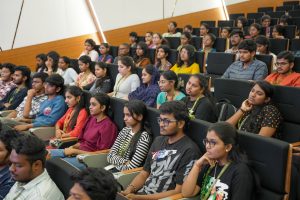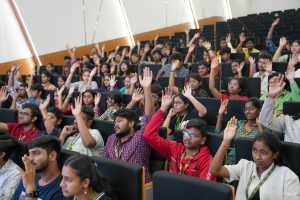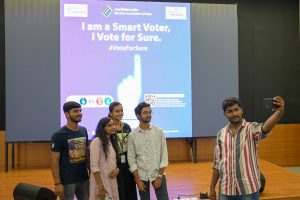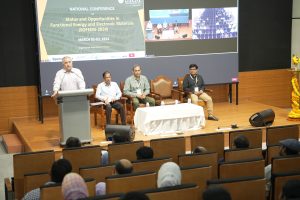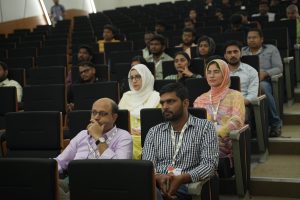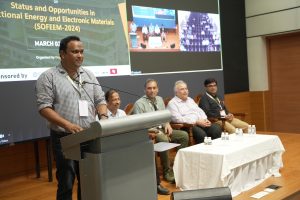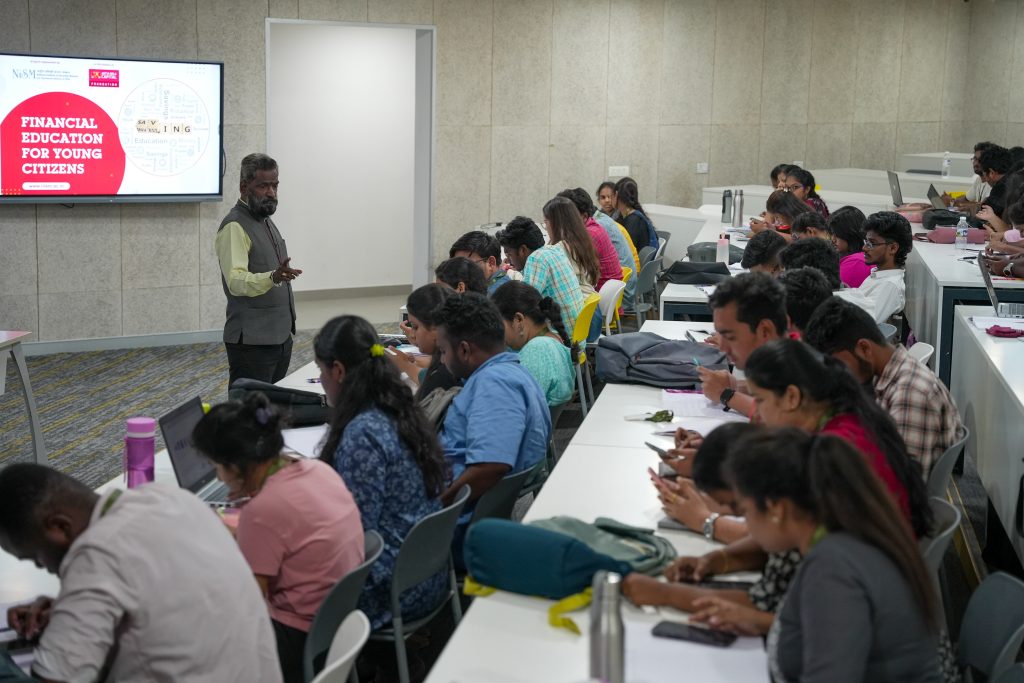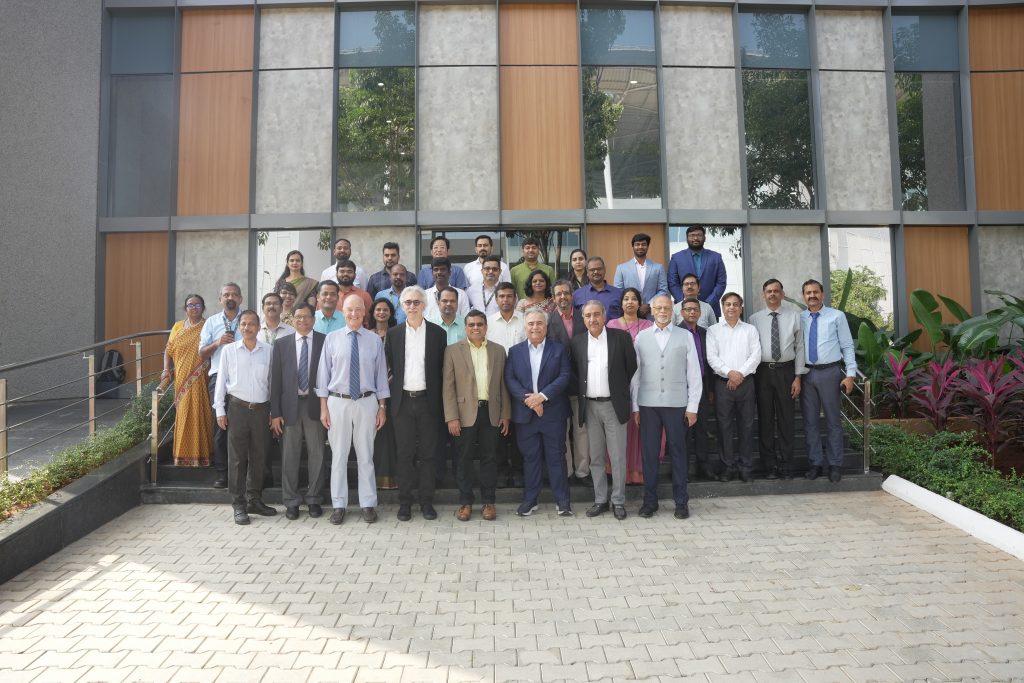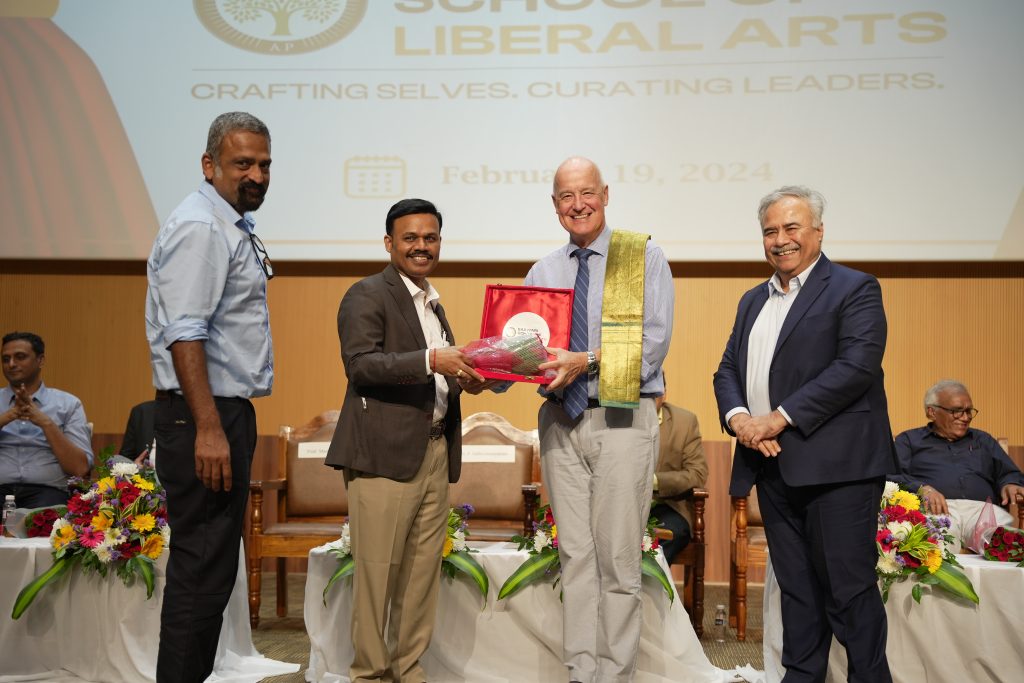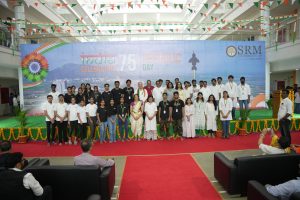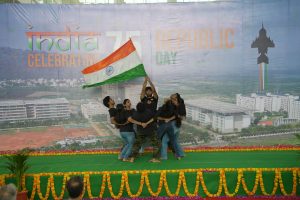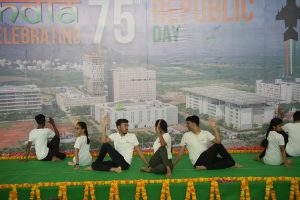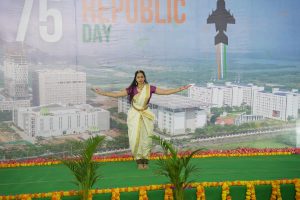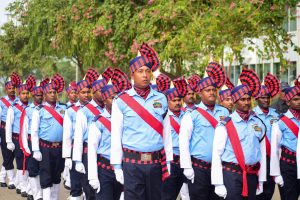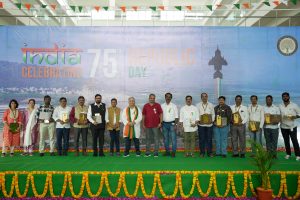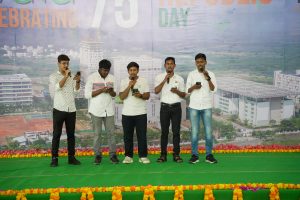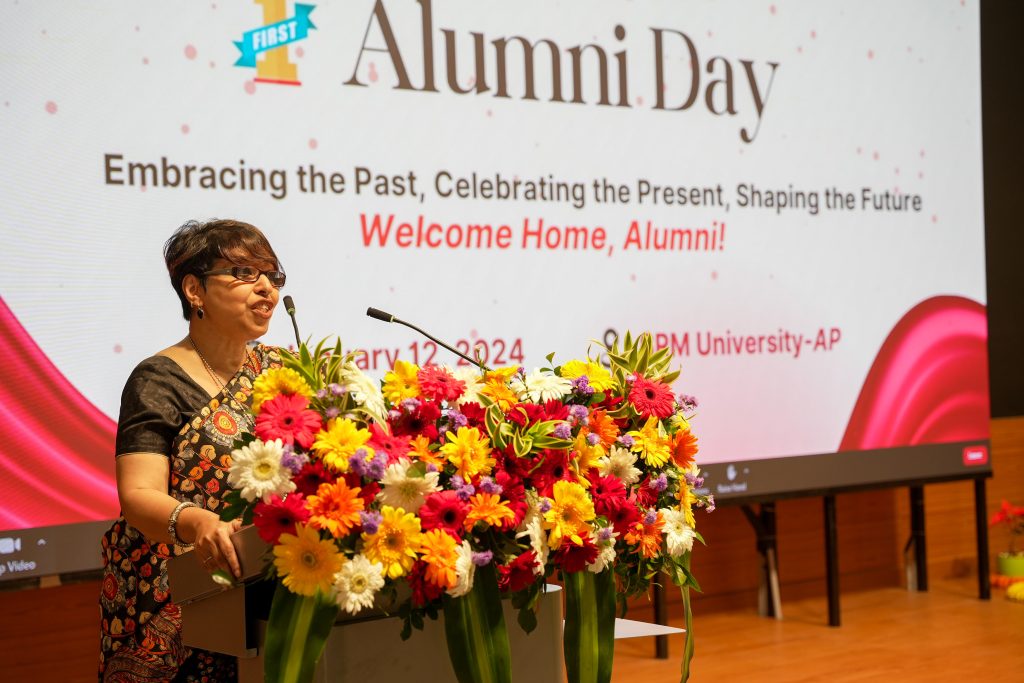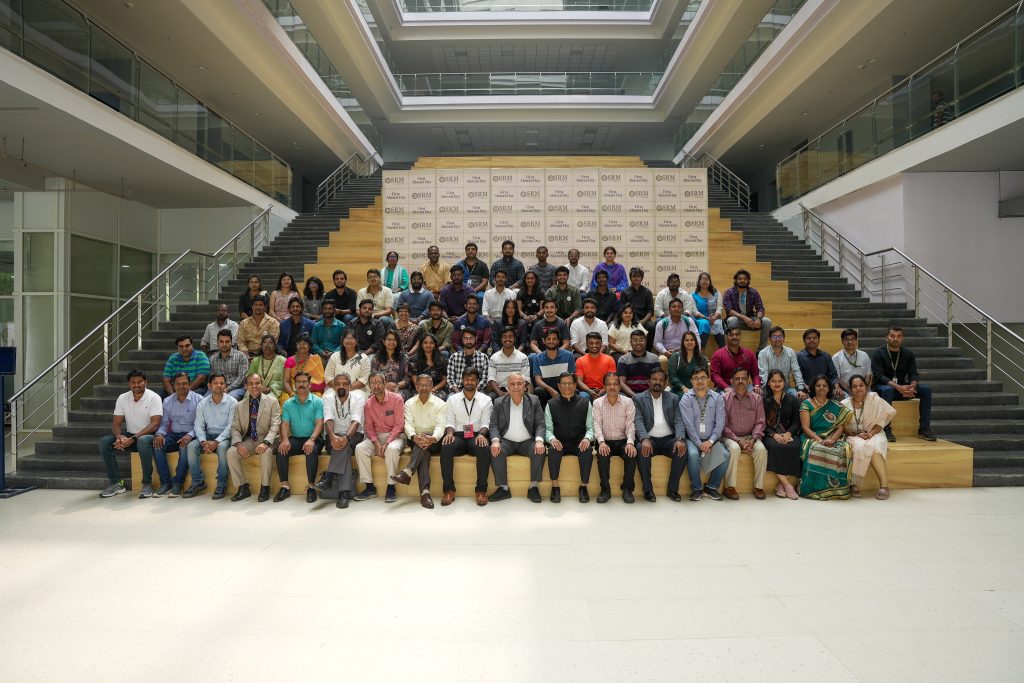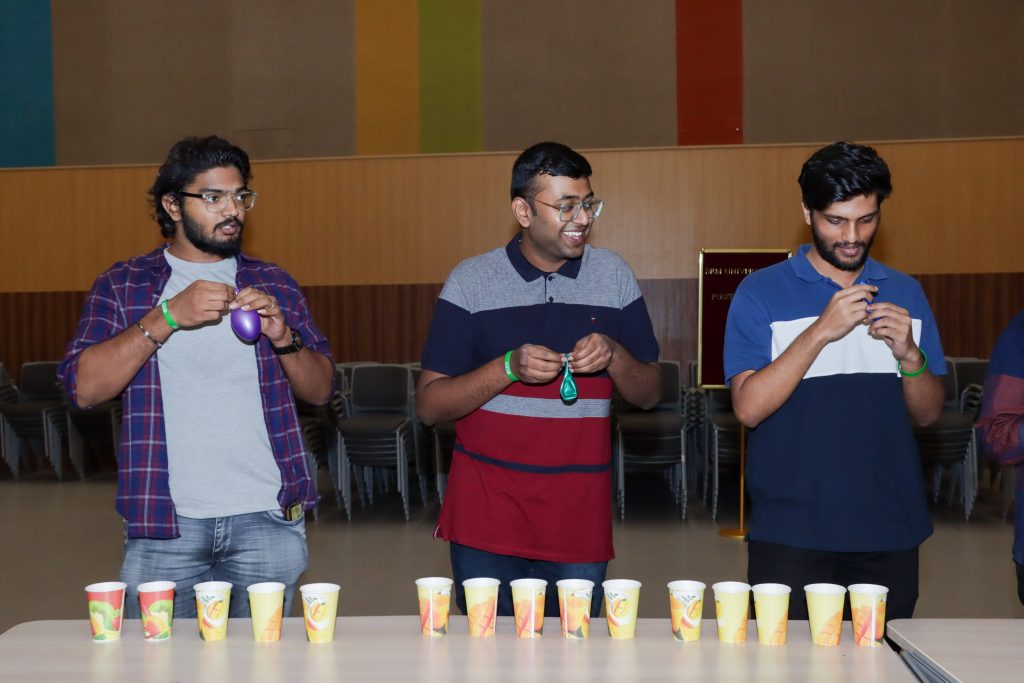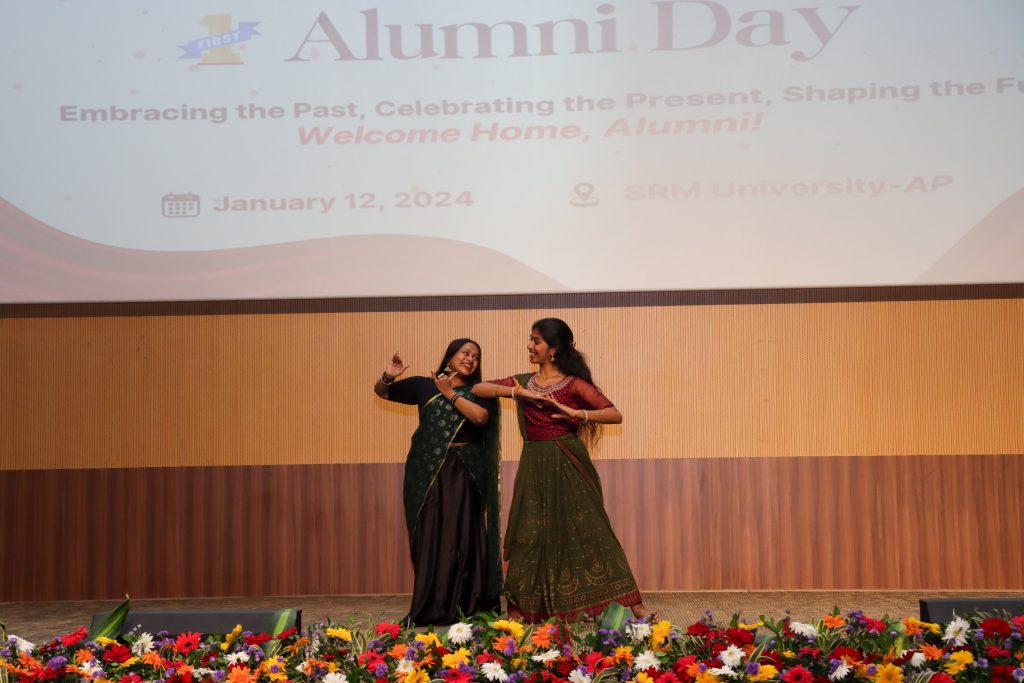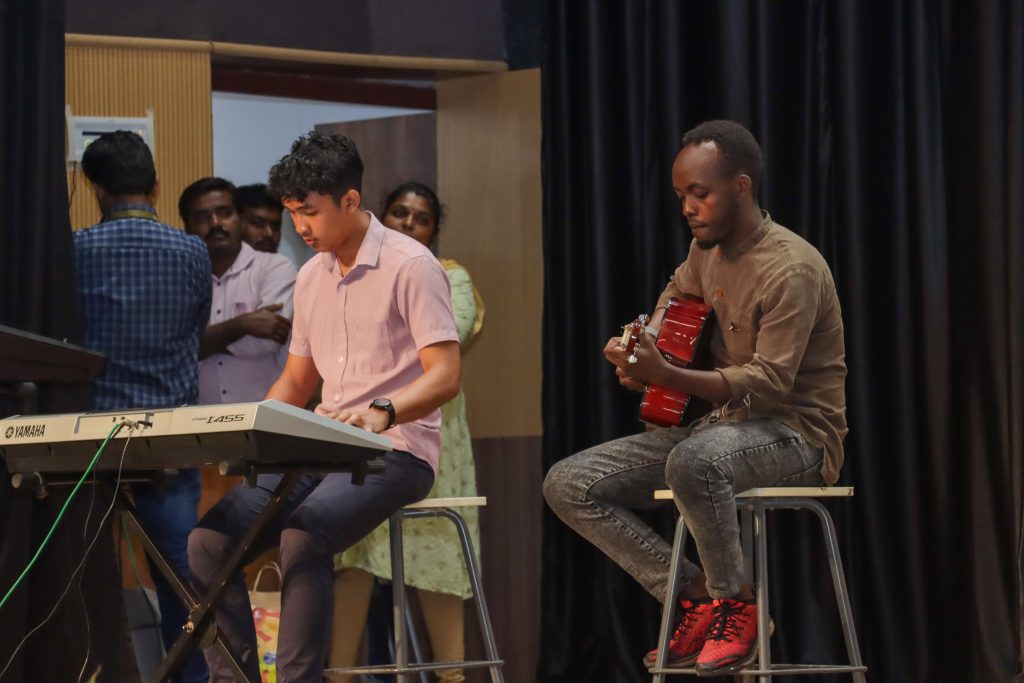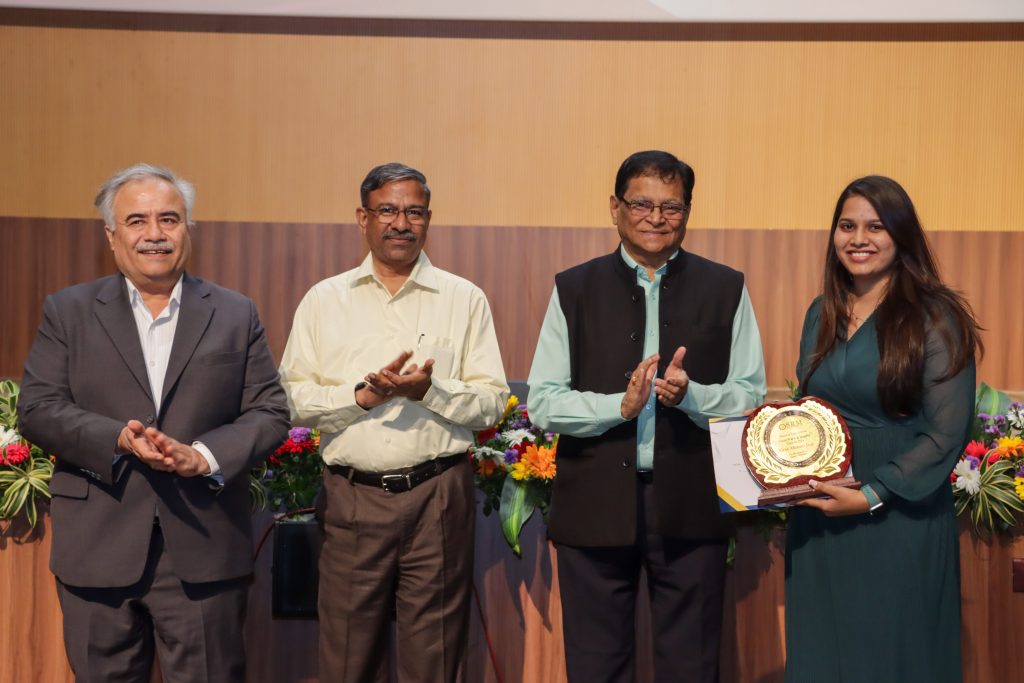Igniting the Flame of Democracy: ‘Mera Pahala Vote Desh ke Liye’ Initiative
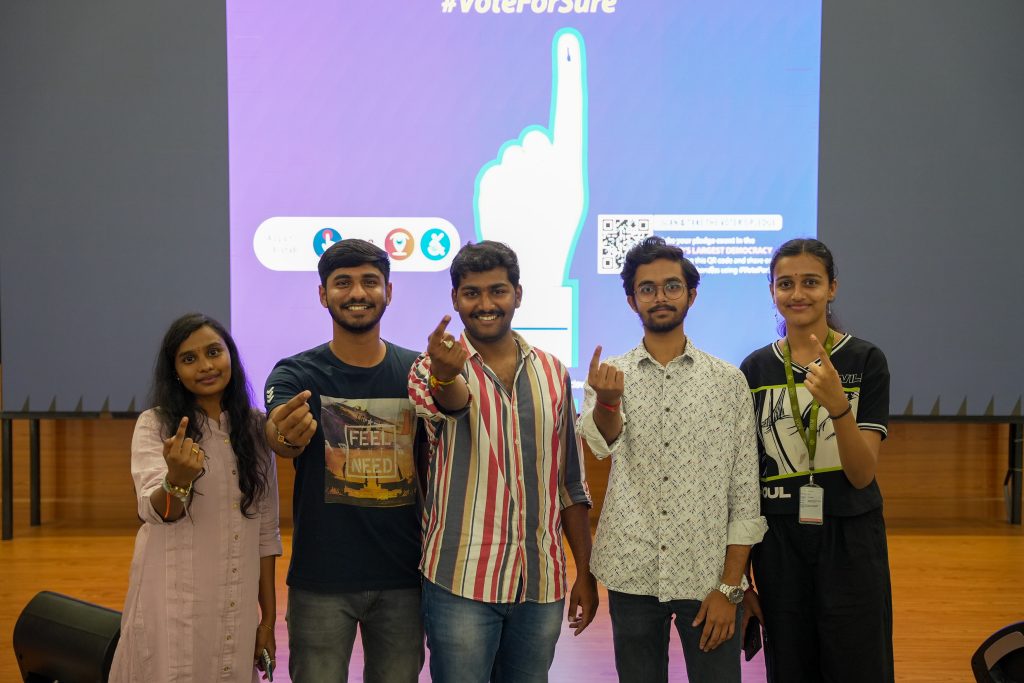
The campus of SRM University-AP was abuzz with a palpable energy as the Directorate of Student Affairs hosted the electrifying “Mera Pahala Vote Desh ke Liye” (My First Vote for the Nation) initiative on March 07, 2024. In a powerful display of civic engagement, students rallied together to celebrate the essence of democracy and ignite the flame of active citizenship.
The event kicked off with a captivating video screening that transported attendees on a journey through India’s vibrant democratic tapestry. Stories of ordinary citizens whose votes reshaped destinies unfolded before their eyes, reminding them of the transformative power they wield with a single mark on the ballot.
As the last frame faded, a solemn hush fell upon the gathering, and a collective pledge echoed through the halls. Students’ voices, united in purpose, vowed to exercise their constitutional rights and make their voices heard in the democratic process. The atmosphere crackled with determination and a renewed sense of responsibility.
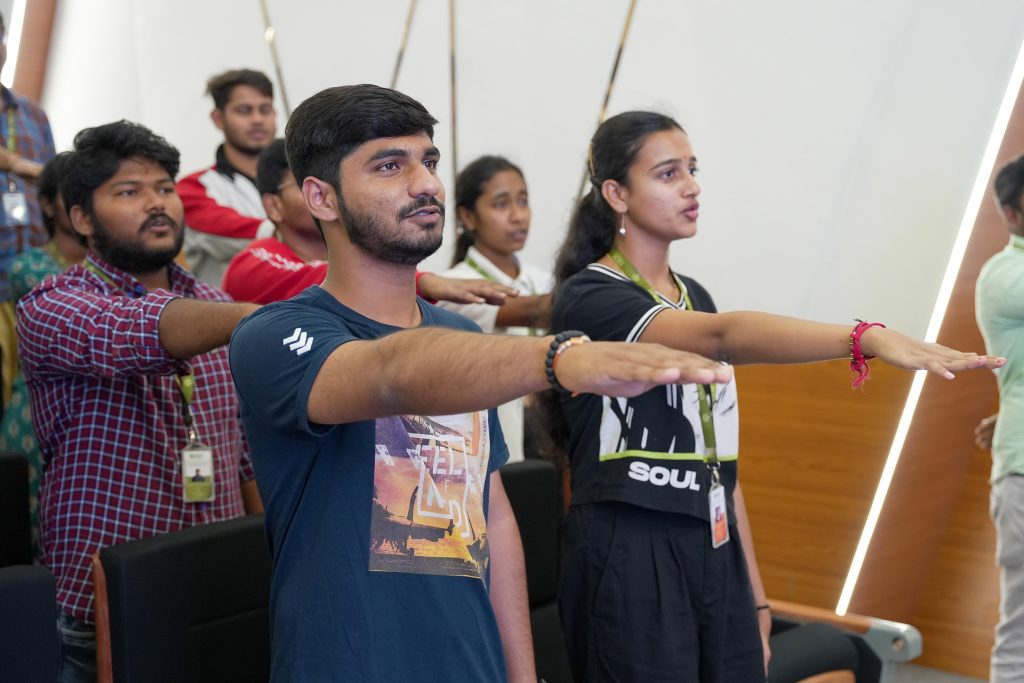
But the celebration didn’t stop there! In a burst of youthful enthusiasm, a dedicated selfie point sprung to life, capturing the infectious energy of the moment. Students eagerly posed, their smiles radiating pride and purpose as they immortalised their commitment to shaping the nation’s future.
SRM University-AP‘s commitment to nurturing responsible citizens was displayed as the institution partnered with the Election Commission of India to kindle the flame of democratic participation. With each selfie shared and pledge taken, a powerful message resounded: the future belongs to those actively shaping it.
As the event drew to a close, the campus hummed with a renewed sense of purpose, a collective awakening to the responsibilities and privileges of being citizens of the world’s largest democracy. The ‘Mera Pahala Vote Desh ke Liye’ initiative has undoubtedly left an indelible mark, igniting a fire within the hearts and minds of SRMites – a fire that will guide them as they navigate the intricate tapestry of India’s democratic journey.
- Published in News, student affairs news, Students Affairs Events
SOFEEM-2024: A National Conference on Functional Energy and Electronic Materials
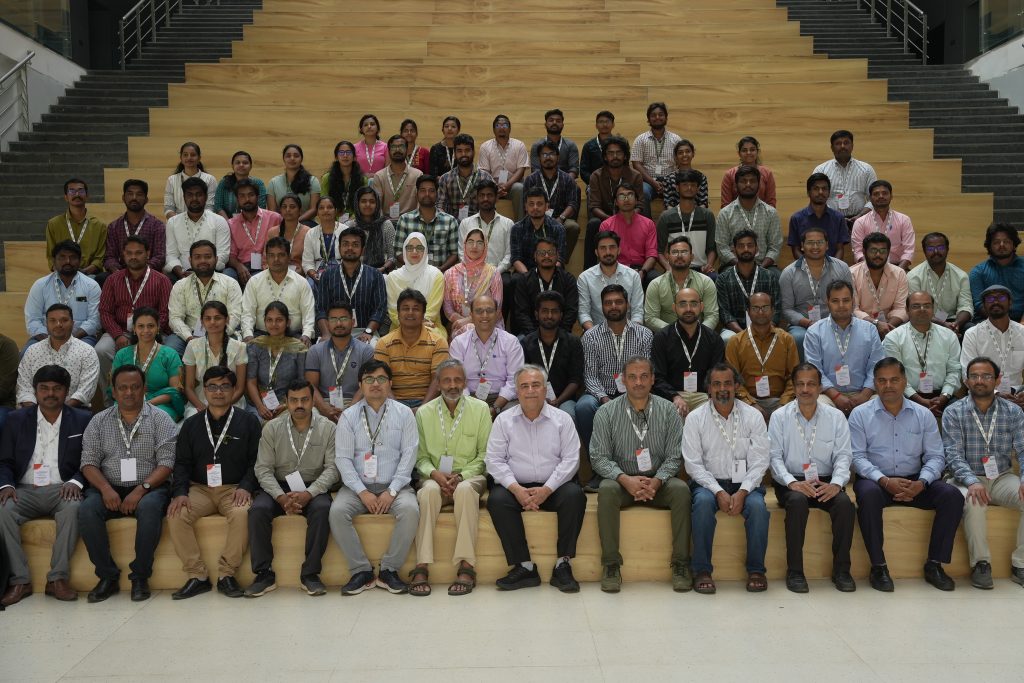
SRM University-AP hosted a national conference on “Status and Opportunities in Functional Energy and Electronic Materials” (SOFEEM-2024) on March 02-03, 2024. The conference was organised by the Department of Physics and was supported by the Department of Science and Technology, Government of India. The conference brought together about 100 participants from various reputed institutions, national laboratories, and universities from India. They shared their research outcomes and discussed the various frontier energy technologies and smart electronic devices.
The main theme of the conference was to boost the development and optimal use of renewable energy and to promote sustainable energy and intelligent electronics. The conference focused on fostering collaboration among researchers and practitioners to explore cutting-edge developments in these domains and pave the way for innovative solutions. A diverse array of topics was covered, including:
- Synthesis and processing of novel energy and electronic materials
- Modelling of low-dimensional materials
- Materials and catalysts for green hydrogen production
- Electrolyte and electrode materials for high-performance batteries and fuel cells
- Functional materials for supercapacitors
- Device fabrication using novel energy materials for energy conversion and storage
- Low-dimensional materials in electronics and photonics
The conference was inaugurated by Prof. Manoj K Arora, Vice Chancellor, who welcomed the guests and the delegates and highlighted the university’s achievements and vision. He also emphasised the importance of interdisciplinary research and innovation in addressing the global energy and environment challenges.
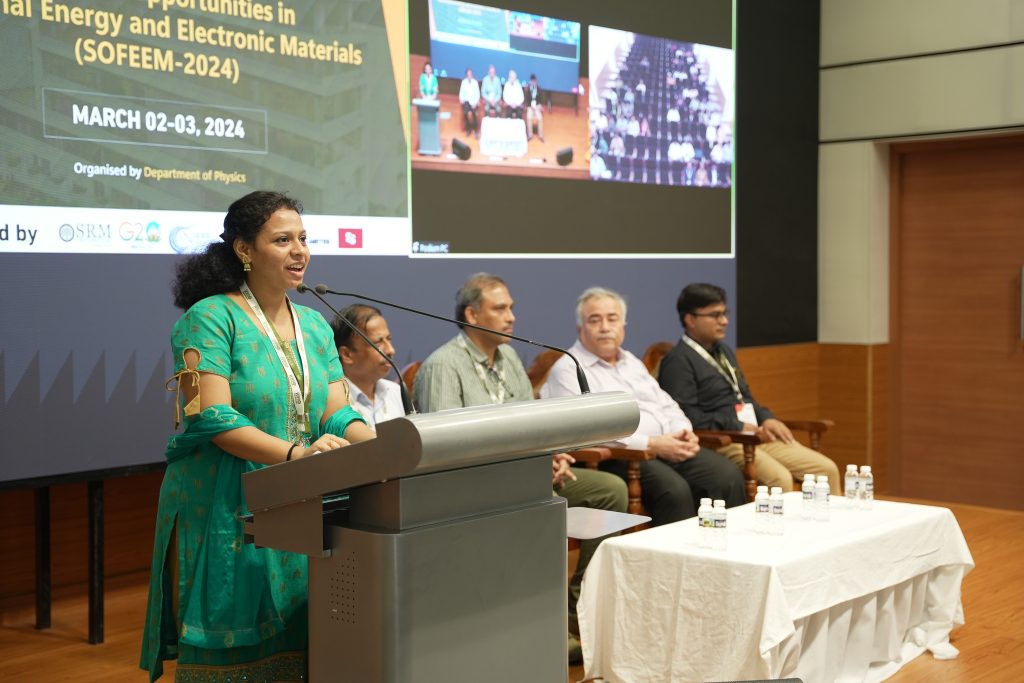
The conference featured keynote lectures, invited talks, oral presentations, and poster sessions by experts and young researchers. Distinguished Keynote speakers from IIT Madras, along with Invited speakers from prestigious institutions such as the Indian Institute of Science (IISC) Bangalore, IIT Tirupati, IIT Hyderabad, University of Hyderabad, IISER Bhopal, and the CSIR – Central Electrochemical Research Institute (CECRI) in Tamil Nadu, among others from esteemed state universities, shared their groundbreaking research. The conference provided a good platform for the participants to interact with the eminent researchers to enrich and share their knowledge in their respective fields of research and engage in potential collaboration to develop innovative technologies in the areas of sustainable energy, advances in materials research and computational sciences. In addition, research scholars from nearby universities (such as VIT-AP, Vignan University, Acharya Nagarjuna University, and SRM-IST) participated in the conference and showcased their current research works.
The conference concluded with awards for the best poster and oral presentation by research scholars, celebrating their significant contributions to the field. The conference concluded with a valedictory session, where the best oral and poster presentations were awarded, and feedback from the participants was collected. The conference was well-received by the attendees, who appreciated the quality and diversity of the scientific discussions, as well as the university’s hospitality and facilities.
- Published in Departmental News, News, Physics News
A Pathbreaking Cross Between Medicine and Technology
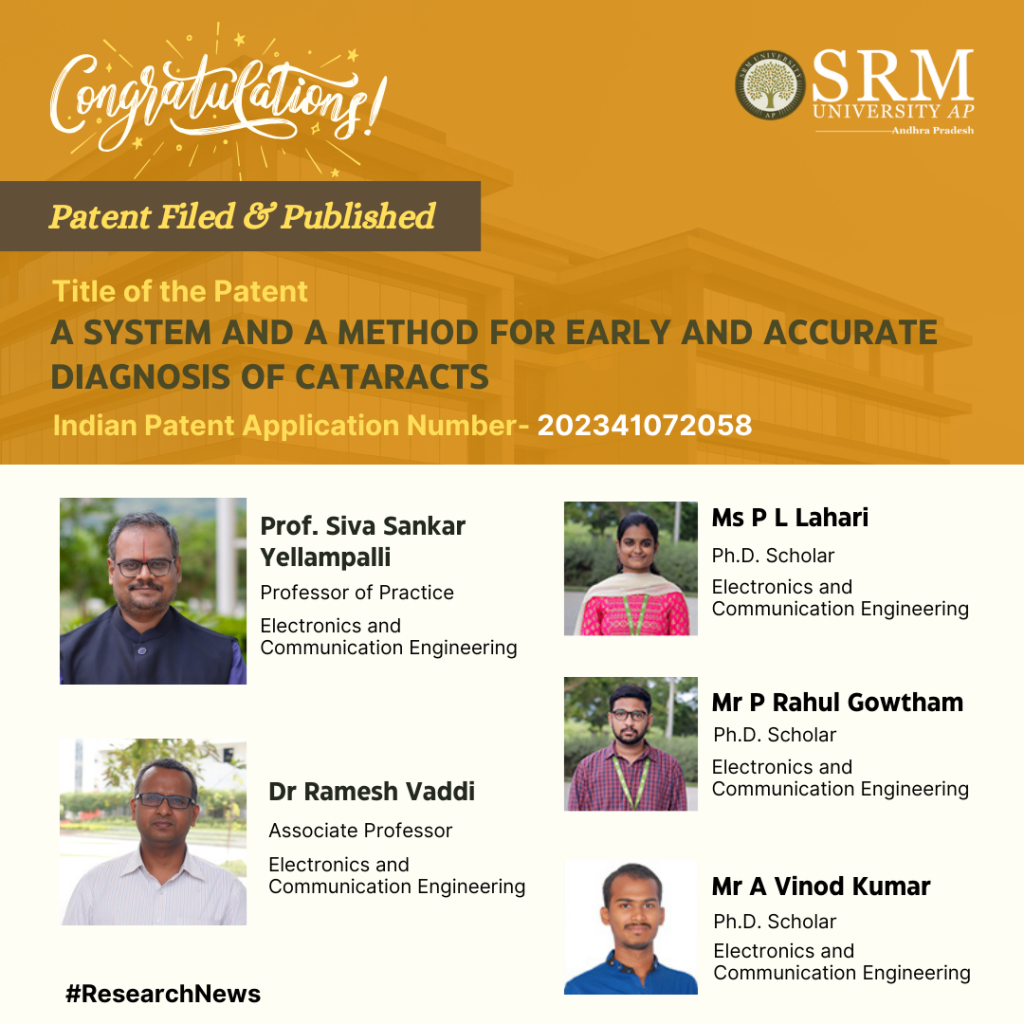
The advent of scientific research and technologies in the domain of medicine has recently taken limelight due to its immense benefit on humankind and the medical community. The expert faculty and scholars have recently published a patent, “A System and a Method for Early and Accurate Diagnosis of Cataracts” with Application no.: 202341072058 has put forth an engaging invention on utilising technology for early cataract recognition. Hearty congratulations to Prof. Siva Sankar Yellampalli, Professor, Dr Ramesh Vaddi, Associate Professor, and their Ph.D. Scholars Ms P L Lahari, Mr P Rahul Gowtham, and Mr A Vinod Kumar from the Department of Electronics and Communication Engineering for this groundbreaking achievement!
Abstract
Cataracts are a common eye condition in which the lens of the eye gets clouded, impairing vision. Early cataract detection is crucial for prompt treatment and vision preservation. We have classification and prediction algorithms like VGG, ResNet, DenseNet, Xception, Inception, and other object detection techniques like Yolo, Fast R-CNN, and SSD. Various pre-trained models are employed for cataract categorisation and prediction. Several attempts to detect cataracts have been made, but none have proven effective. A clinical examination by eye specialists is used to diagnose cataracts. An edge board can be used instead of a clinical examination to diagnose cataracts.
We created a method for real-time cataract recognition using the present pre-trained weights of the object detection model YoLoV5. We employ pre-trained YoLo V5 weights for model training, testing, and validation. Connect the Jetson Nano board and Lenovo HD USB camera to the CPU, which serves as the CPU. The monitor is used for programming, and the output is presented on the monitor owing to the board communicating with the camera. The result shows the image with an eye labelling box that tells if the eye is normal or cataract.
- Published in Departmental News, ECE NEWS, News, Research News
Young Investors Workshop for Management Graduates
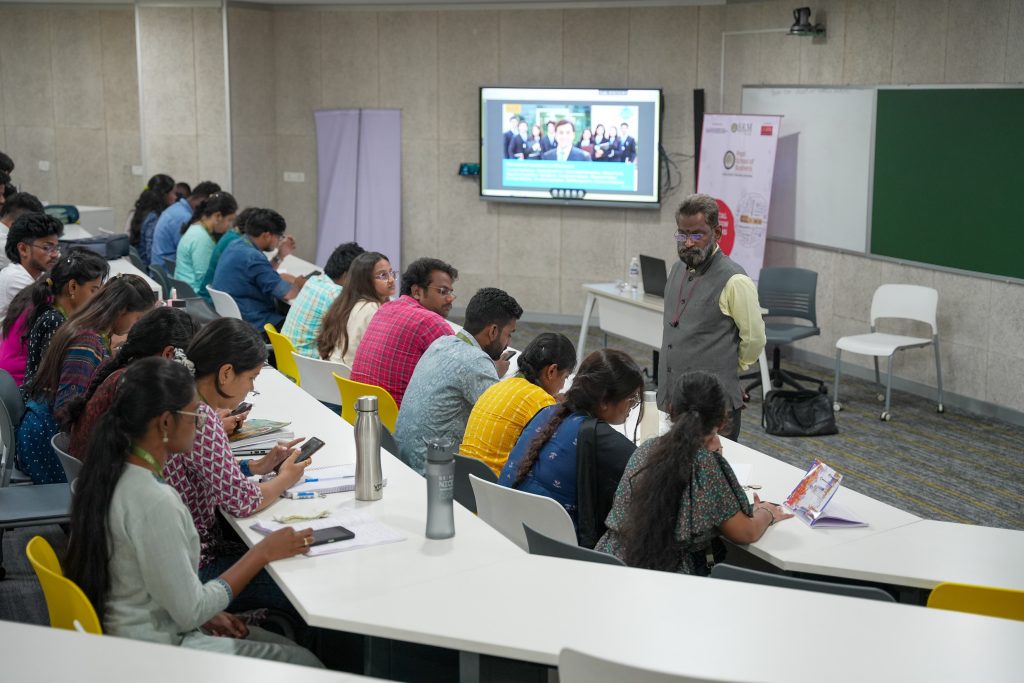
The Paari School of Business has organised a transformative two-day Young Investor Education Workshop on “Financial Education for Young Citizens” for MBA students on February 26-27, 2024, led by finance expert Dr Vijaya Kumar Chilukuri from NISM. The sessions covered diverse finance intricacies and career strategies. Certificates were awarded to participants who cleared the examination, adding value to their academic journey. A Pre-assessment and post-assessment were conducted, which helped students understand their learning journey. Dr Chilukuri’s expertise and his interactive sessions left a lasting impact on all the students, and they actively participated in learning many key concepts of savings and investments. These workshops conducted by the school align with SRM AP’s commitment to holistic education and student success.
- Published in Departmental News, News, Paari Current Happenings, paari-events
Pioneering the Future: Ultrafine MgAl2O4 Particle-Stabilised Mg-3Ca Alloy Foams
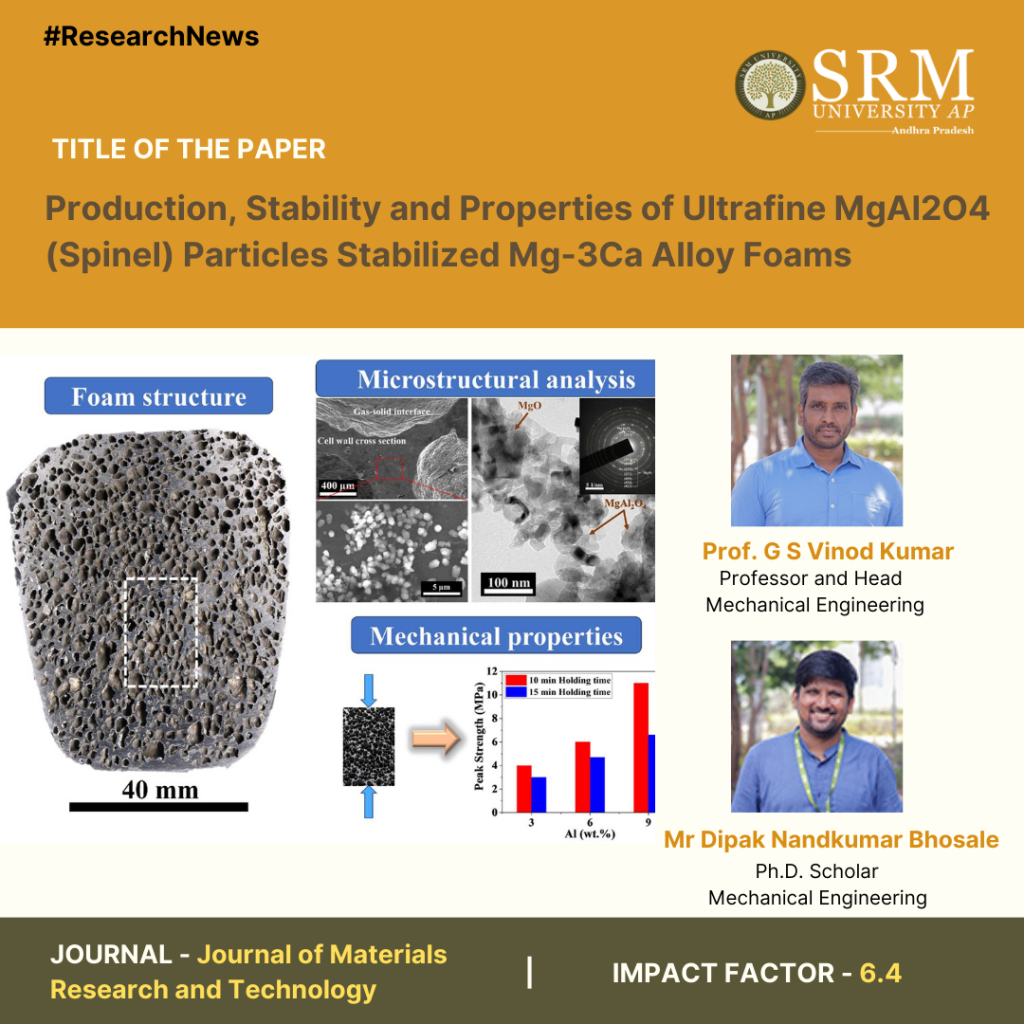
The Department of Mechanical Engineering is thrilled to announce a significant breakthrough in materials science has been achieved through the diligent research efforts of Prof. G S Vinod Kumar, Professor and Head of the Department and his Ph.D. scholar, Mr Dipak Bhosale in their latest paper, “Production, stability and properties of ultrafine MgAl2O4 (Spinel) particles stabilized Mg-3Ca alloy foams”. The study focuses on the development and detailed analysis of Mg–3Ca alloy foams, uniquely enhanced by ultrafine MgAl2O4 (spinel) particles. This innovative research outlines a novel methodology for improving the mechanical properties of magnesium foams, providing unparalleled advantages for a multitude of industrial applications.
Abstract
The present work reports the synthesis and mechanical behaviour studies of Mg–3Ca alloy foams stabilized by ultrafine MgAl 2 O 4 (spinel) particles. The MgAl 2 O 4 particles were created in-situ in the Mg–3Ca alloy melt through the reaction of Mg, Al and O. Foaming was done by adding dolomite (CaMg(CO 3 ) 2 ) as a blowing agent in the melt. The foaming behaviour was studied for different MgAl 2 O 4 content in Mg–3Ca and holding times (10 and 15 min). The study reveals that the presence of MgAl 2 O 4 significantly influences the foaming behaviour of Mg–3Ca alloy resulting in equiaxed cell structure, uniform cell size distribution, and higher expansion in comparison to the Mg–3Ca alloy foam, which contains only MgO and CaO. An in-depth phase and microstructural analysis were performed to investigate the particles present in the gas-solid interface of the foam that contribute to foam stabilization. The quasi-static compression studies of foams exhibited better compressive strength (≈3–11 MPa) and energy absorption capacity (≈1.3–5.7 MJ/m3) in comparison to the Mg foams reported in the literature. The ductility of the Mg foams was also measured and compared with that of existing aluminium foams.

Research Highlights:-
- Innovative Synthesis: The MgAl2O4 particles are synthesized in situ within the Mg–3Ca alloy melt via a controlled reaction involving Mg, Al, and O. This process ensures the uniform dispersion of spinel particles, which is critical for the foam’s structural integrity and performance.
- Foaming Process: By employing dolomite (CaMg(CO3)2) as a blowing agent, the research team meticulously explored the foaming behaviour under various MgAl2O4 contents and holding times (10 and 15 min). The findings highlight a marked improvement in foam expansion and stability.
- Structural and Mechanical Analysis: Through comprehensive phase and microstructural analyses, the pivotal role of MgAl2O4 particles at the gas-solid interface in stabilizing the foam structure was uncovered. Quasi-static compression tests revealed outstanding compressive strength (≈3–11 MPa) and energy absorption capacity (≈1.3–5.7 MJ/m3), surpassing existing benchmarks for magnesium foams.
Key Properties and Applications:-
- Low Density & High Strength-to-Weight Ratio: The Mg–3Ca alloy foams showcase an optimal balance of low density and high mechanical strength, rendering them ideal for lightweight structural applications.
- Enhanced Energy Absorption: Their unique cellular structure provides superior energy absorption capabilities, suitable for impact and crash-resistant applications.
- Biocompatibility: Owing to magnesium’s biocompatibility, these foams are highly promising for biomedical applications, including bone implants and scaffolds for tissue engineering.
- Thermal Conductivity & Corrosion Resistance: Additionally, these foams exhibit advantageous thermal and corrosion-resistant properties, broadening their applicability across various environmental conditions.
Transformative Impact Across Industries:-
- Aerospace and Automotive: The significant weight reduction capabilities, coupled with uncompromised strength, position the Mg–3Ca alloy foams as revolutionary materials for component design in the aerospace and automotive sectors.
- Biomedical: Their biocompatible nature and structural characteristics make these foams an excellent option for medical implants and scaffolds, poised to improve patient outcomes in orthopaedics and tissue engineering significantly.
- Energy and Beyond: From thermal management solutions in renewable energy systems to applications in sports equipment, the potential uses for these magnesium foams are extensive and diverse, heralding a new chapter in material science.
This groundbreaking research not only advances the field of magnesium foam technology but also paves the way for new possibilities in lightweight, high-performance materials across various industries. The team is dedicated to further exploring the capabilities of these innovative materials and eagerly anticipates partnering with industry stakeholders to transition these advancements from the laboratory to commercial applications.
- Published in Departmental News, Mechanical Engineering NEWS, News, Research News
Invited as Chief Guest at Tech Symposium
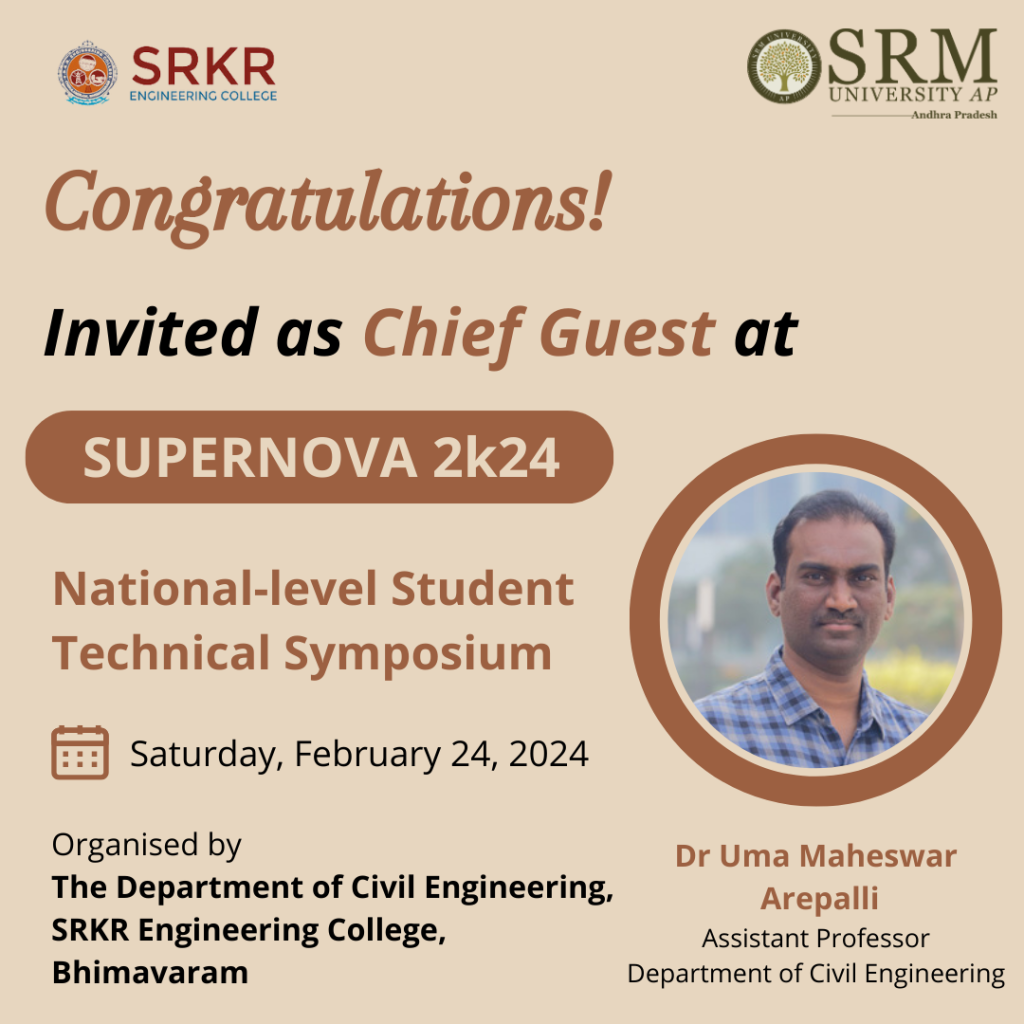
Dr Uma Maheswar Arepalli, Assistant Professor in the Department of Civil Engineering, has been invited as the esteemed Chief Guest at SUPERNOVA-2k24, a prestigious National Level Student Technical Symposium organised by SRKR Engineering College, Bhimavaram on February 24, 2024.
This is a well-deserved feather in the cap for Dr Arepalli, whose expertise in the field of civil engineering knows no bounds. Dr Arepalli will also deliver an expert lecture inspiring enthusiastic students to become young engineers!
Here’s to many more accolades coming your way, Dr Arepalli! From shaping young minds to pushing the boundaries of innovation, he’s a true trailblazer!
- Published in CIVIL NEWS, Departmental News, News
Shaping an Academic Scholarly Milieu: Grand Launch of Easwari School of Liberal Arts
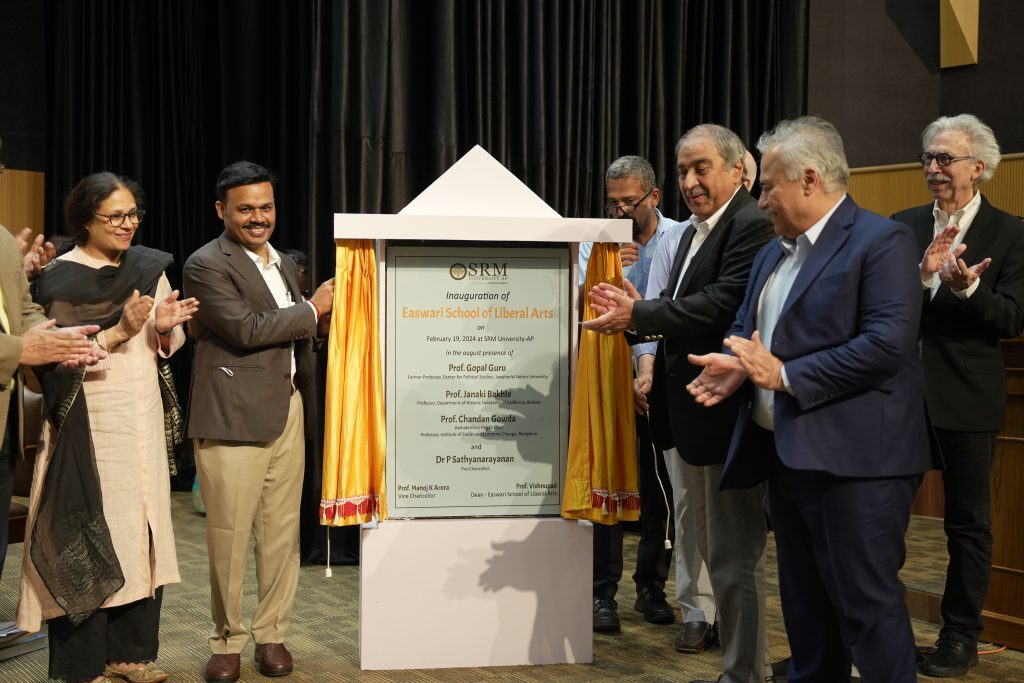
SRM University-AP relaunched the School of Liberal Arts and Social Sciences as the Easwari School of Liberal Arts, establishing a new era of transformative learning and research to address the complexities of human society. The school was inaugurated in the august presence of Pro-Chancellor Dr P Sathyanarayanan; Vice Chancellor Prof. Manoj K Arora; Members of the Governing Body – Prof. Pradeep Khosla, Chancellor, University of California, San Diego, Prof. Nicholas B Dirks, Emeritus Chancellor, University of California, Berkeley, Prof. Prasant Mohapatra, Vice Chancellor for Research and Provost and Vice President for Academic Affairs, University of South Florida, and Prof. Andrew D Hamilton, President, New York University; Dean – Easwari School of Liberal Arts, Prof. Vishnupad; Deans and Directors of various departments and faculty, staff and students of the university. Prof. Gopal Guru, Former Professor, Center for Political Studies, JNU; Prof. Janaki Bakhle, Associate Professor at the University of California, Berkeley; and Prof. Chandan Gowda, Ramakrishna Hegde Chair Professor, Institute of Social and Economic Change, Bengaluru, graced the momentous occasion as Guests of Honour.
The rechristened Easwari School of Liberal Arts aims to propel students’ intellectual, emotional and ethical growth, equipping them to become future knowledge creators. “The launch of Easwari School of Liberal Arts is a testament to the university’s commitment to interdisciplinary learning and research. Through a sound liberal arts education, we aim to cultivate diversified skills among our students,” remarked Vice Chancellor Prof. Manoj K Arora in his address. Prof. Vishnupad, Dean – Easwari School of Liberal Arts, further expounded on the symbolic renaming of the school and its established imperative to foster a three-fold growth in students – emotional, ethical and intellectual.
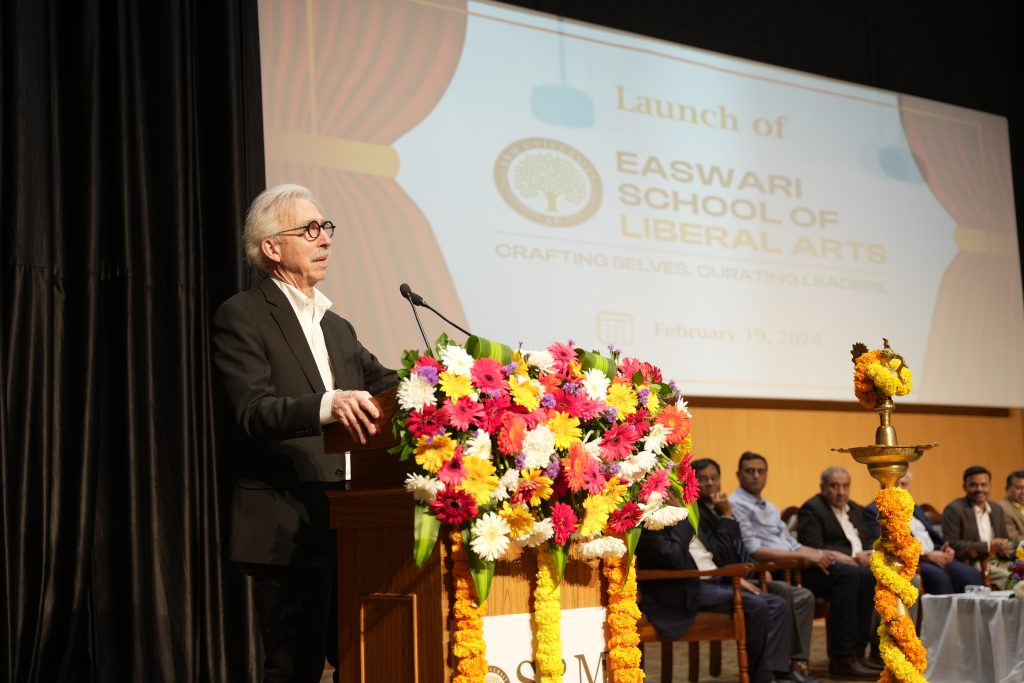
Pro-Chancellor, Dr P Sathyanarayanan commented that Easwari School of Liberal Arts opens the doorway to a brave new world of learning that will forge visionary thinkers. The School advocates breaking the academic silos of disciplines and offering students a more comprehensive integrated learning experience. In his address, Prof. Nicholas Dirks, Honourary Pro-Chancellor and a Governing Body member of SRM AP, stated, “Liberal Arts is a constitutive element of comprehensive education. SRM University-AP, with the launch of a dedicated School of Liberal Arts, is on its path to develop into an excellent comprehensive institute of higher education.”
The grand launch also witnessed a keynote speech by Guest of Honour, Prof. Gopal Guru, on the significance of liberal arts education in comprehending, analysing and solving the complexities of postmodern society. Insightful and inspiring book discussions on the books “Savarkar and the Making of Hindutva”, authored by Prof. Janaki Bakhle and “Another India: Events, Memories, People”, by Prof. Chandan Gowda, offering critical insights into the raw sentimentality of Indian society were highlights of the event.
The Easwari School of Liberal Arts harbours a robust, socially relevant, innovative curriculum, a distinguished and committed faculty, and imaginative and engaged teaching and learning methods to cultivate a class of motivated student ambassadors of tomorrow. In addition to offering traditional programmes such as B.A/B.Sc.(Hons.) in English, Economics, History, Psychology and B.Com in International Accounting; the School has also launched three pioneering programmes, namely, B.A. (Hons.) in Politics, Media Studies and Sociology and Anthropology, to equip students on how to address the socio-political, cultural and economic outlook of today’s society. With a novel pedagogy, these innovative programmes nurture logical reasoning, dynamic perspectives, rigour in thought and ideas, and critical reflection among students.
- Published in News, SLASS, University Event
Rethinking Ionic Liquids as an Environment-friendly Solvent
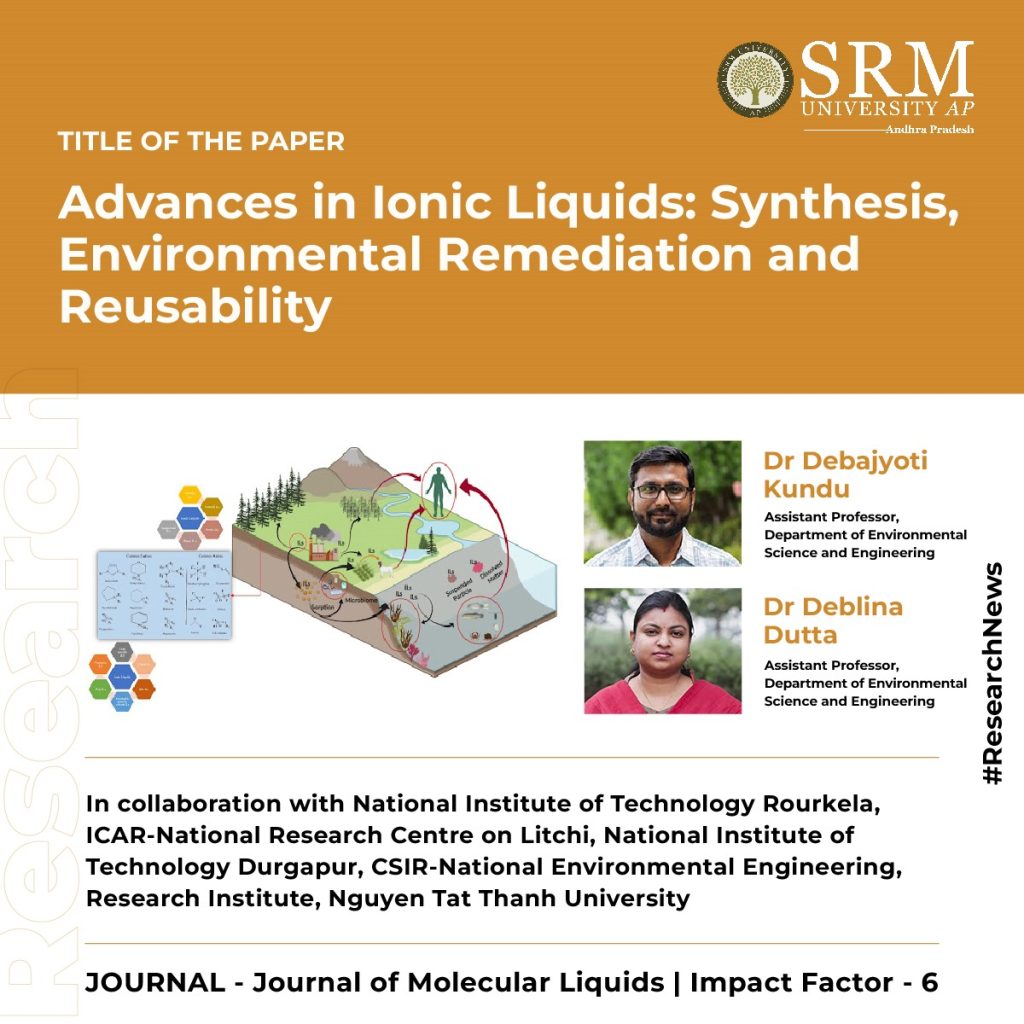
Dr Debajyoti Kundu and Dr Deblina Dutta, Assistant Professors, Department of Environmental Science and Engineering, have conducted seminal research on Ionic Liquids (ILs) in their paper “Advances in ionic liquids: Synthesis, environmental remediation and reusability” published in the Q1 journal, Journal of Molecular Liquids with an impact factor of 6. In the research article, the faculty duo have delved into the unique properties of ionic liquids, focusing on their role in environmental cleanup and showcasing their ability to combat pollutants. Various methods to recycle and reuse ILs, develop eco-friendly ILs, and scale up their application for effective environmental remediation have also been extensively explored.
Abstract
Ionic liquids (ILs) are next-generation solvents synthesised by organic salts, possessing negligible vapour pressure and low flammability. They possess high thermal and electrochemical stability, can be reused for multiple cycles, and their properties can be tuned according to the components used in their synthesis. Hence, ILs are considered to be potential alternatives for conventional organic solvents for numerous applications such as environmental remediation, nanoparticle synthesis, catalysts in various chemical reactions, solvents for the extraction of biomolecules from recalcitrant lignocellulosic biomass, etc. In this review article, the holistic approach of ILs, starting from various techniques adopted for their synthesis along with its critical review, is discussed, followed by a detailed discussion of the mechanism involved in the remediation of environmental pollutants using ILs. Further, in-depth documentation of various environmental pollutants remediated using ILs has been done to date. One of the major drawbacks of solvent application is the reusability factor, and hence, in this review article, techniques adopted to recycle/reuse ILs have been discussed. Further, the adverse effects of using ILs for environmental remediation have been comprehensively discussed to present a holistic view. Future studies should focus on synthesising environment-friendly ILs and their field-scale applications for environmental remediation.
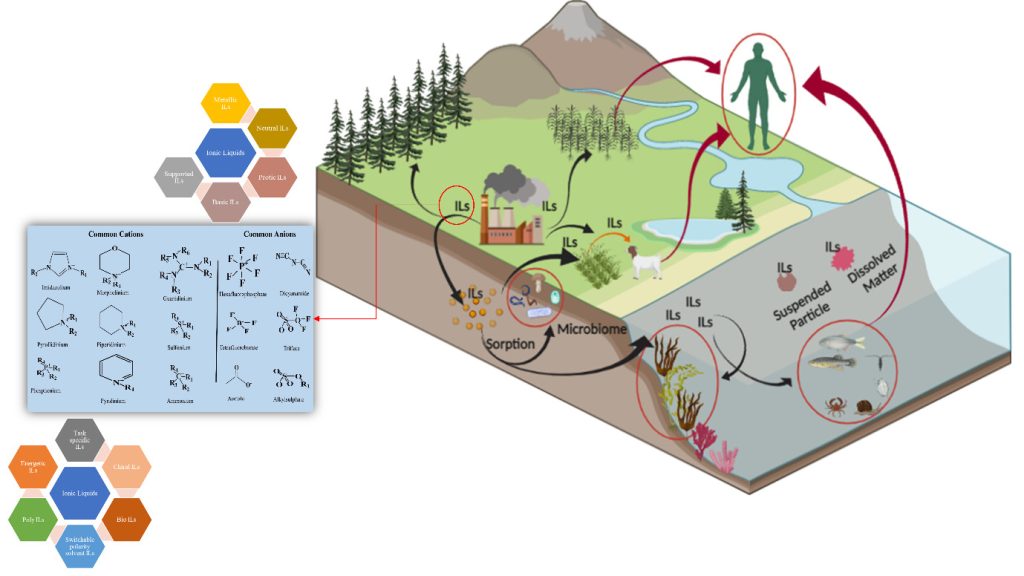
Practical implementation/social implications of the research
Their research on Ionic Liquids (ILs) presents a transformative approach to environmental challenges. By applying ILs on a larger scale for cleaning polluted air and water, promoting recycling and reusability, and developing eco-friendly ILs, the work has direct implications for industries and communities. The adoption of IL-based technologies contributes to efficient environmental cleanup and aligns with the growing societal demand for sustainable practices. Successful field-scale applications and public awareness initiatives can lead to a cleaner and healthier environment, demonstrating the tangible benefits of incorporating ILs into real-world solutions and fostering a more responsible and eco-conscious society.
Collaborations:-
- National Institute of Technology Rourkela
- ICAR-National Research Centre on Litchi
- National Institute of Technology Durgapur
- CSIR-National Environmental Engineering Research Institute
- Nguyen Tat Thanh University
Dr Kundu and Dr Dutta remarks that their future research in the realm of Ionic Liquids (ILs) will prioritise the development of environmentally sustainable synthesis methods, rigorous assessments of biodegradability and toxicity, and integrating ILs into industrial processes. Scaling up studies to evaluate their effectiveness in large-scale environmental remediation, investigating public perceptions, and fostering multidisciplinary collaborations with experts from diverse fields will be crucial for the responsible adoption of IL-based technologies. Additionally, focusing on life cycle assessments, exploration of novel applications, policy recommendations, and educational outreach can collectively contribute to advancing the understanding and practical implementation of ILs, ensuring a holistic and impactful approach to their environmental applications.
Click to read the article!
- Published in Departmental News, ENVS News, News, Research News
“A University That Resonates with the Nation”: 75th Republic Day Celebrations
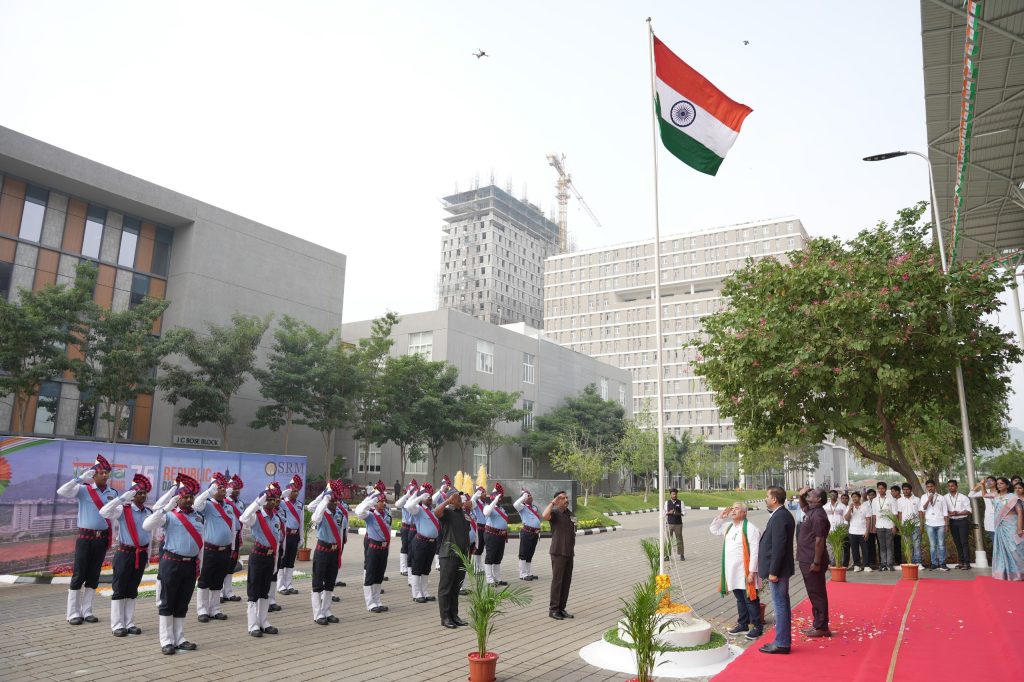
SRM University-AP celebrates the 75th Republic Day with a grand amalgamation of pleasure, pride and patriotism. Vice Chancellor of the university, Prof. Manoj K Arora unfurled the national flag commemorating India’s journey as a secular, social, republic and democratic nation. The celebration was also joined by the Panchayat secretaries of the neighbouring 5 villages – Neerukonda, Kanteru, Nidamaru, Kuragallu and Pedaparupudi who were felicitated by the Vice Chancellor and Dr Vinayak Kalluri, Dean – Academic Affairs. These villages have been adopted by the university to develop into smart villages through student projects and ventures.
“On this momentous day, let us remember the golden heritage of our nation and pay homage to the architect of our constitution, Dr B R Ambedkar. Let us strive towards achieving Viksit Bharat@2047 by channelling the energy and intellect of our youth into developing our nation and society and shaping students into global citizens“, said Prof. Arora as he addressed the campus community that had gathered to celebrate the auspicious day. The Vice Chancellor also emphasised the pivotal role of an educational institution in enlightening the students on constitutional rights and moulding them into reasonable and responsible citizens of the country. He also delivered a comprehensive report on the progress and growth of the university in one academic year highlighting the numerous achievements and recognitions secured by the students, scholars and faculty in academic, research, entrepreneurship and other frontiers.
The Republic Day celebrations commenced with an awarding ceremony where staff who had completed 5 years of service at the university were bestowed with a token of appreciation and gratitude. Students were awarded accolades for victories at various competitions at South Zone championships and Bravery awards were presented to security personnel and staff who rendered their service during calamities. A parade by the university security personnel paying tribute to the country and various cultural programmes by students resonating with patriotic fervour were highlights of the event.
- Published in News, student affairs news, University Event
1st Alumni Day: A Walk Down the Memory Lane
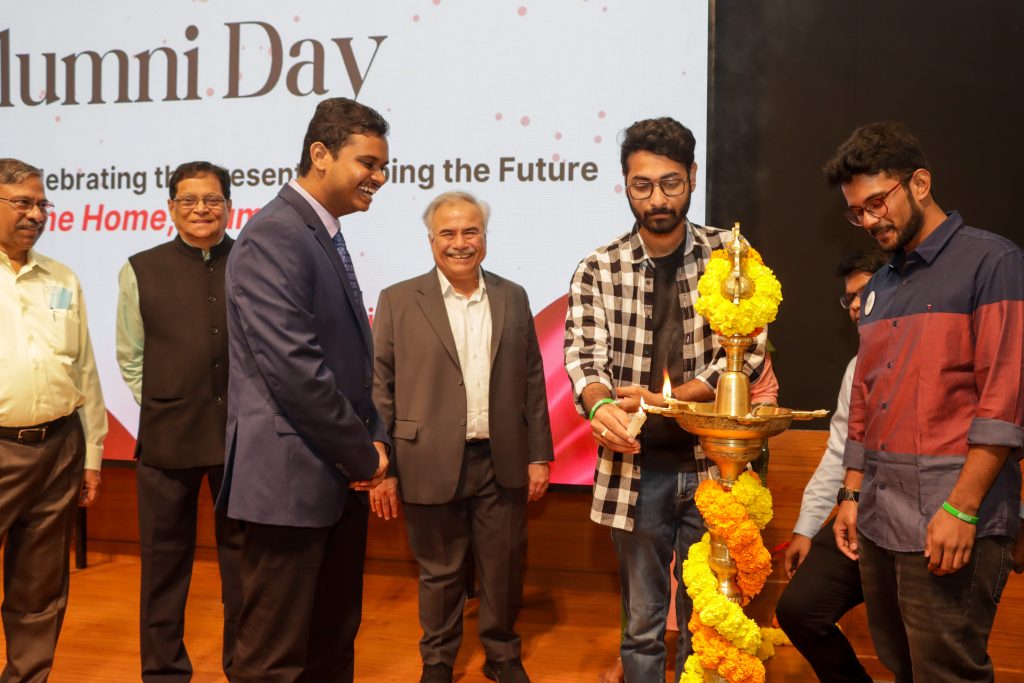
The 1st Alumni Day of SRM University-AP, organised by the Directorate of Alumni Relations, was held in grand splendour on January 12, 2024. Alumni from near and far gathered at the campus with many attending the event virtually from all corners of the world. Vice Chancellor Prof. Manoj K Arora launched the auspicious day by lighting the lamp in the presence of Registrar Dr R Premkumar, Advisor Prof. V S Rao, Head of Alumni Relations Dr Srabani Basu and the participating alumni. The Student Alumni Relations Committee (SARC) was also launched on this day, further aiming to strengthen alumni association and engagement.
“You are the founding batches that have sowed the seeds for our institute to grow and develop into a premier university. You, our alumni, are significant stakeholders of our institution and with your intellect and expertise, the varsity can grow exponentially”, stated Prof. Manoj K Arora while addressing the alumni. He also presented an extensive report on the stellar growth of the university since its inception on academic, research, and entrepreneurial frontiers, emphasising the rise of SRM University-AP, as a world-class university. Deans and associate deans of all schools also led a brief presentation on the school/s accomplishments, development and proposed plan of action for the next five years.
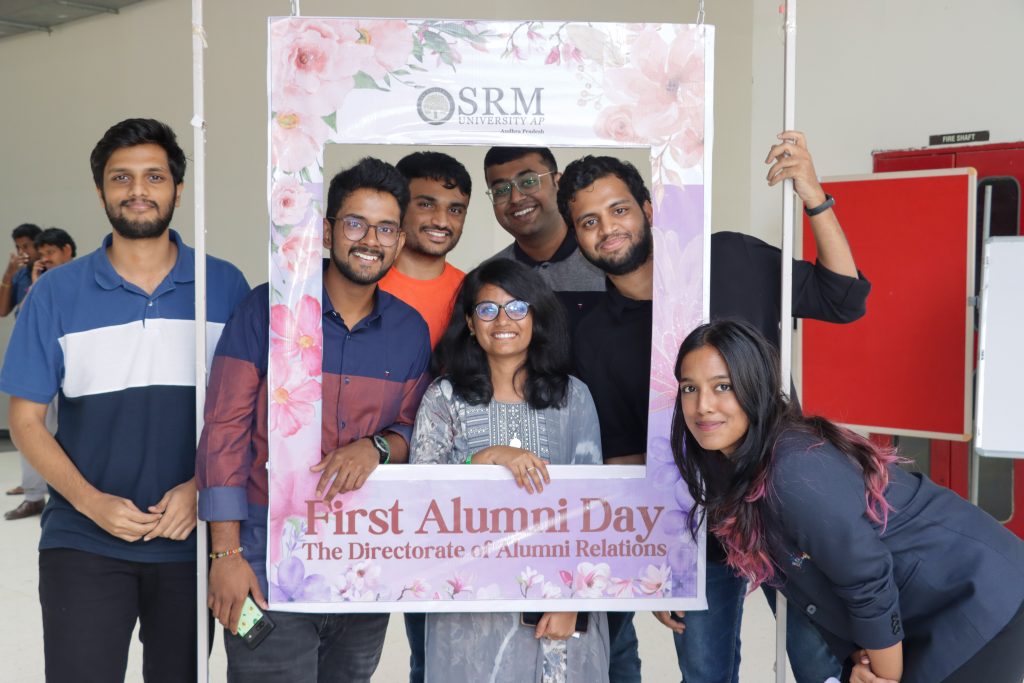
Pro-Chancellor, Dr P Sathyanarayanan, in his virtual address to the alumni gathered to celebrate the splendid day, commented, “A campus is the embodiment of the present students’ aspirations and the cherished memories of its alumni. The alumni are true reflections of what we aim to do as a new-age university”. Numerous alumni also exhibited their deepest appreciation and gratitude towards their alma mater that has shaped their future and moulded them into the leaders, entrepreneurs, engineers and executives they are today.
The Alumni Day successfully concluded with cultural programmes, games and activities catered for the alumni to relive their campus experience, cherish past memories and create new ones. The event is a testament to the university’s advancements in fostering a symbiotic relationship with its alumni that would help the institute reach the pinnacle of growth and excellence.
- Published in Alumni, Alumni Relations News, News


